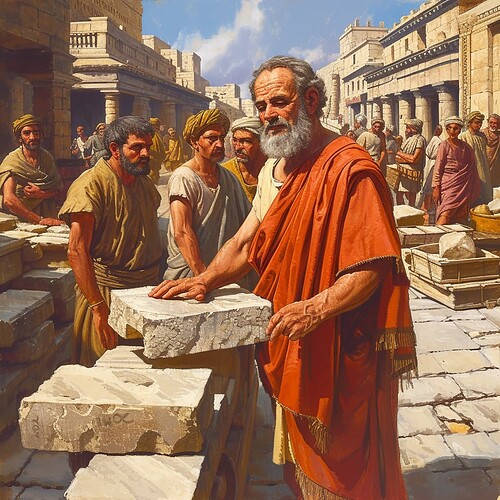![]() February 21: 1 Corinthians 3 - Building with Purpose, Pursuing Spiritual Maturity
February 21: 1 Corinthians 3 - Building with Purpose, Pursuing Spiritual Maturity
![]() Introduction
Introduction
In this enlightening chapter, Apostle Paul addresses the Corinthian church, confronting divisions and encouraging spiritual growth.
![]() Spiritual Infancy and Divisions
Spiritual Infancy and Divisions
Paul chides the Corinthians for their divisive, immature behavior. They’ve been squabbling over their preferred apostles (Paul or Apollos), suggesting a lack of understanding of the Gospel’s unity-centric message.
![]() Key Verse: “For when one says, ‘I follow Paul,’ and another, ‘I follow Apollos,’ are you not mere human beings?” (1 Corinthians 3:4)
Key Verse: “For when one says, ‘I follow Paul,’ and another, ‘I follow Apollos,’ are you not mere human beings?” (1 Corinthians 3:4)
![]() The Builders and the Foundation
The Builders and the Foundation
Paul uses metaphors to describe how God’s work is carried out. We are co-workers, building on the foundation of Jesus Christ; however, the quality of our work will be tested.
![]() Key Verse: “For no one can lay any foundation other than the one already laid, which is Jesus Christ.” (1 Corinthians 3:11)
Key Verse: “For no one can lay any foundation other than the one already laid, which is Jesus Christ.” (1 Corinthians 3:11)
![]() Key Themes and Reflections
Key Themes and Reflections
![]() Unity: Christian service isn’t a competition; all work toward the same purpose, building on Christ’s foundation.
Unity: Christian service isn’t a competition; all work toward the same purpose, building on Christ’s foundation.
![]() Reward and Judgment: The quality of our work as Christians will be revealed and evaluated for its lasting impact.
Reward and Judgment: The quality of our work as Christians will be revealed and evaluated for its lasting impact.
![]() Today’s Application
Today’s Application
In a world that promotes individual accomplishment, let’s remember our Christian call to unity. We’re all laborers in God’s field, responsible for cultivating growth, valuing each other’s contributions, and building on the foundation of Christ.
![]() Hidden Gem
Hidden Gem
Did you know that the metaphor of fire testing our works (vs. 13) derives from ancient practices of testing metals for purity?
![]() Reflective Q&A:
Reflective Q&A:
![]() Why is unity crucial in the Church?
Why is unity crucial in the Church?
A: To witness the Gospel effectively, the Church must demonstrate love and unity that surpasses worldly divisions.
![]() What does spiritual maturity look like?
What does spiritual maturity look like?
A: It reflects deeper understanding of God’s Word, leading to a life aligned with Christ, free from unnecessary divisions and strife.
![]() Join the Discussion:
Join the Discussion:
Reflect on how you can contribute to unity in your church and community, and what it means to build on Christ.
![]() See You Tomorrow in online Bible studies on 1 Corinthians 4 and 5:
See You Tomorrow in online Bible studies on 1 Corinthians 4 and 5:
Expect insights on honor and dishonor in ministry and confronting immorality in the church.
Remember, each of us is laying bricks in the grand, spiritual edifice called the Church. Let’s do so carefully, focusing on unity and the foundation: Jesus Christ.
